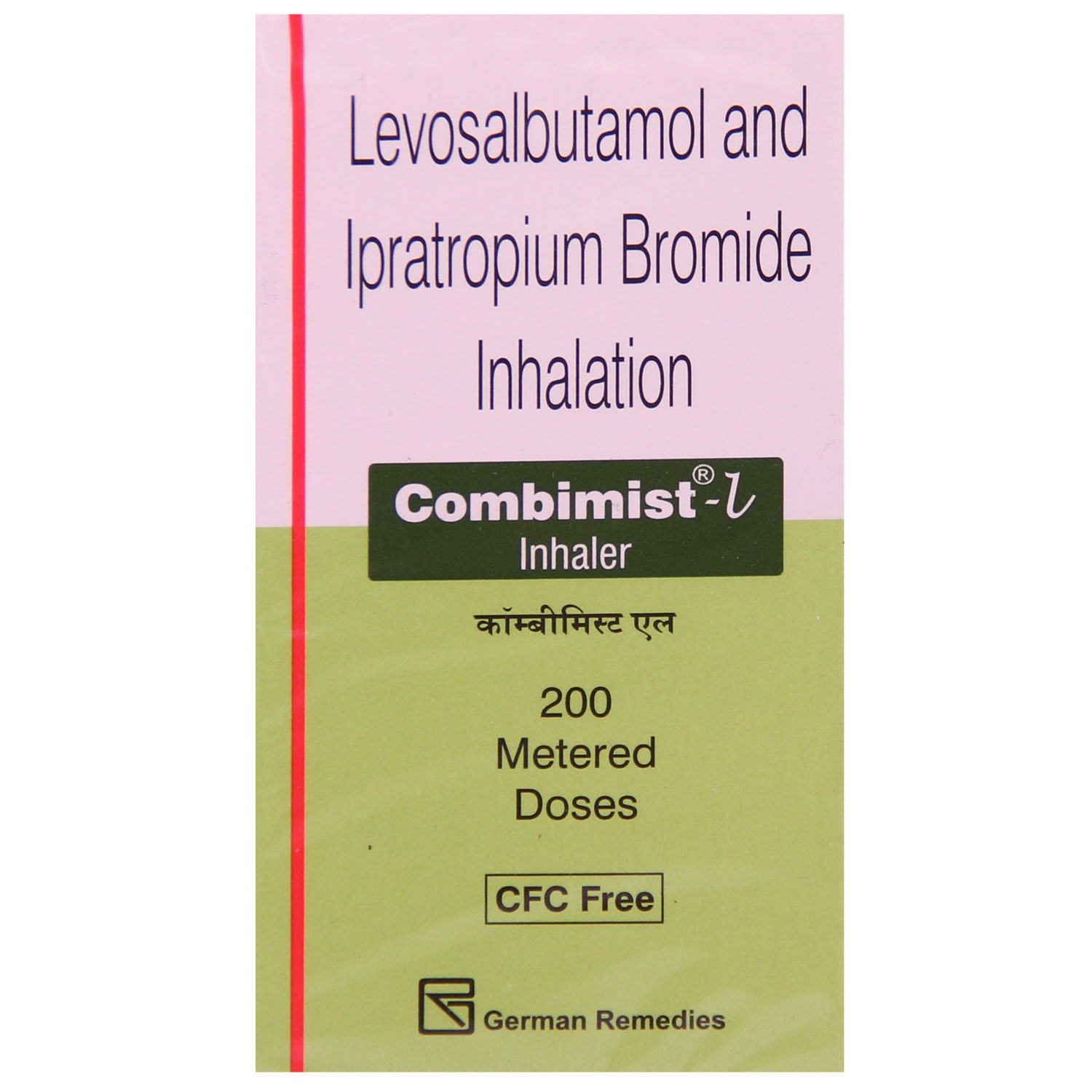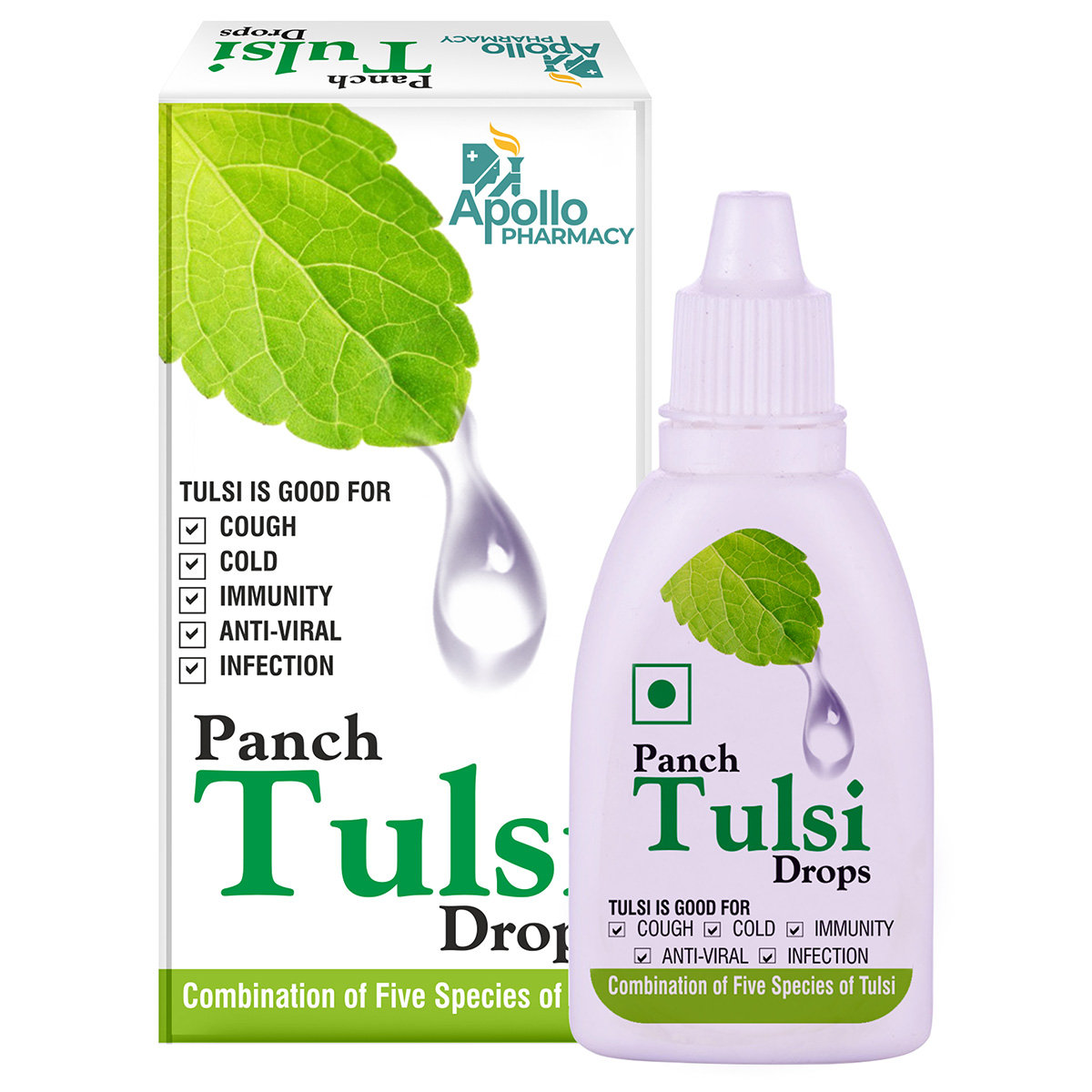Duolin Inhaler
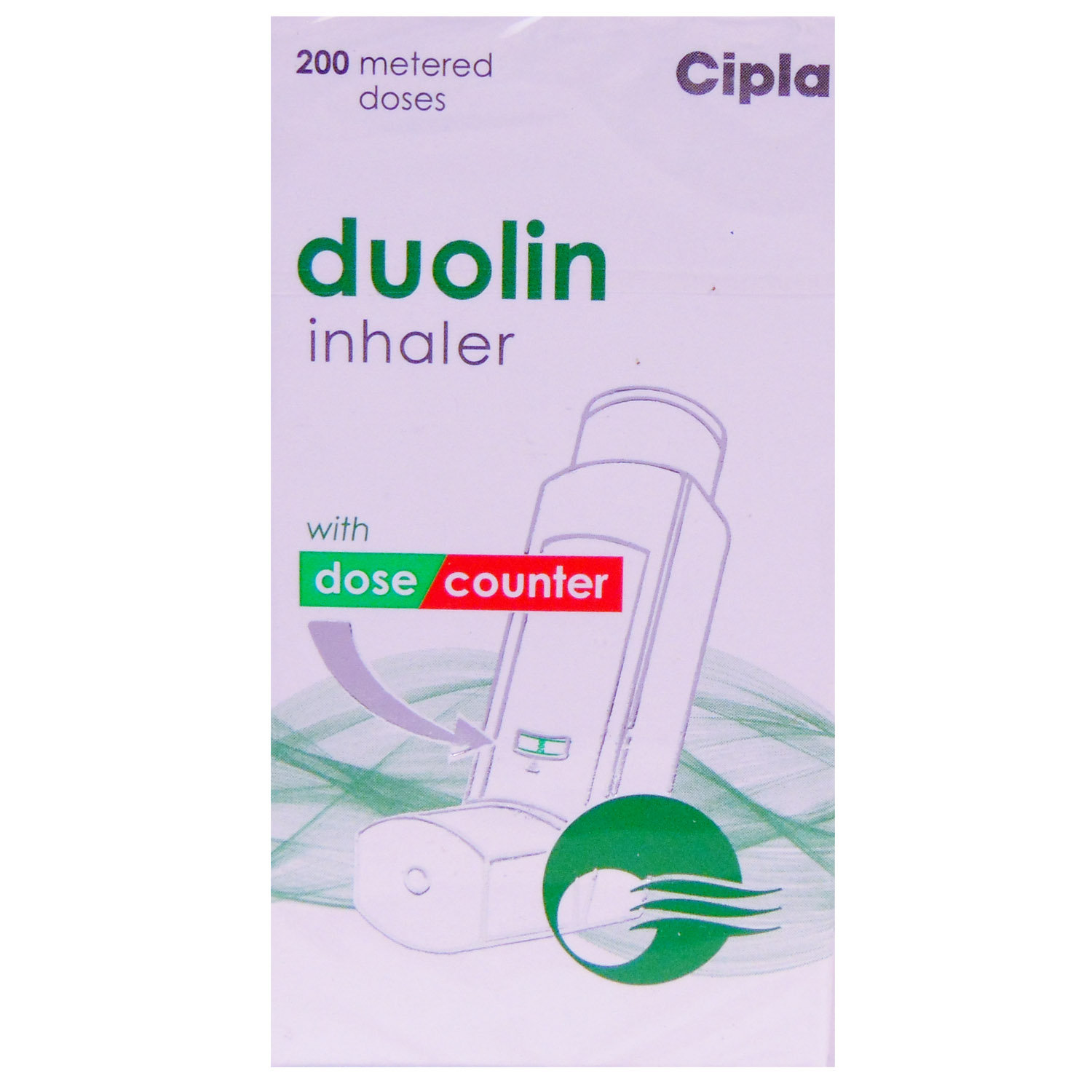
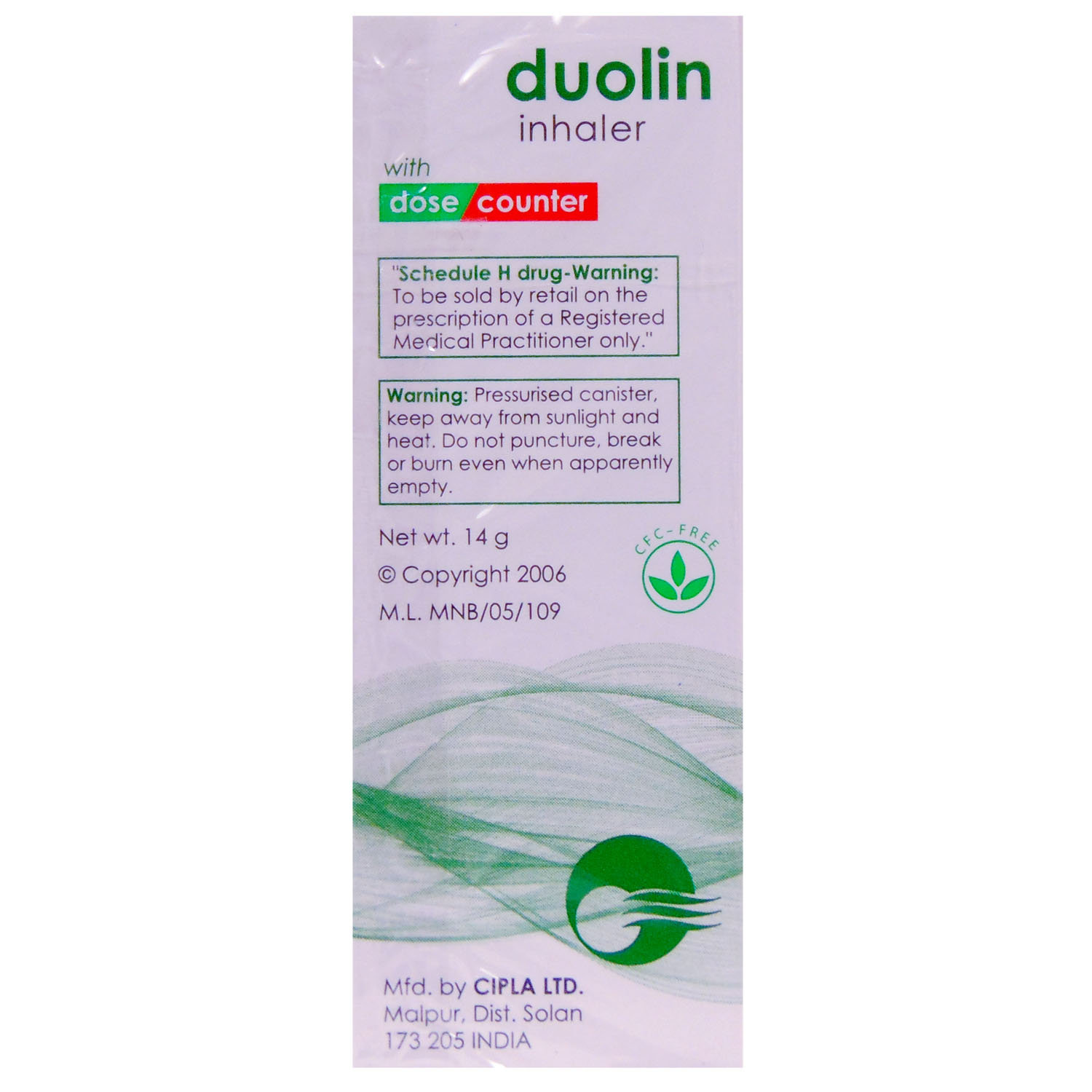
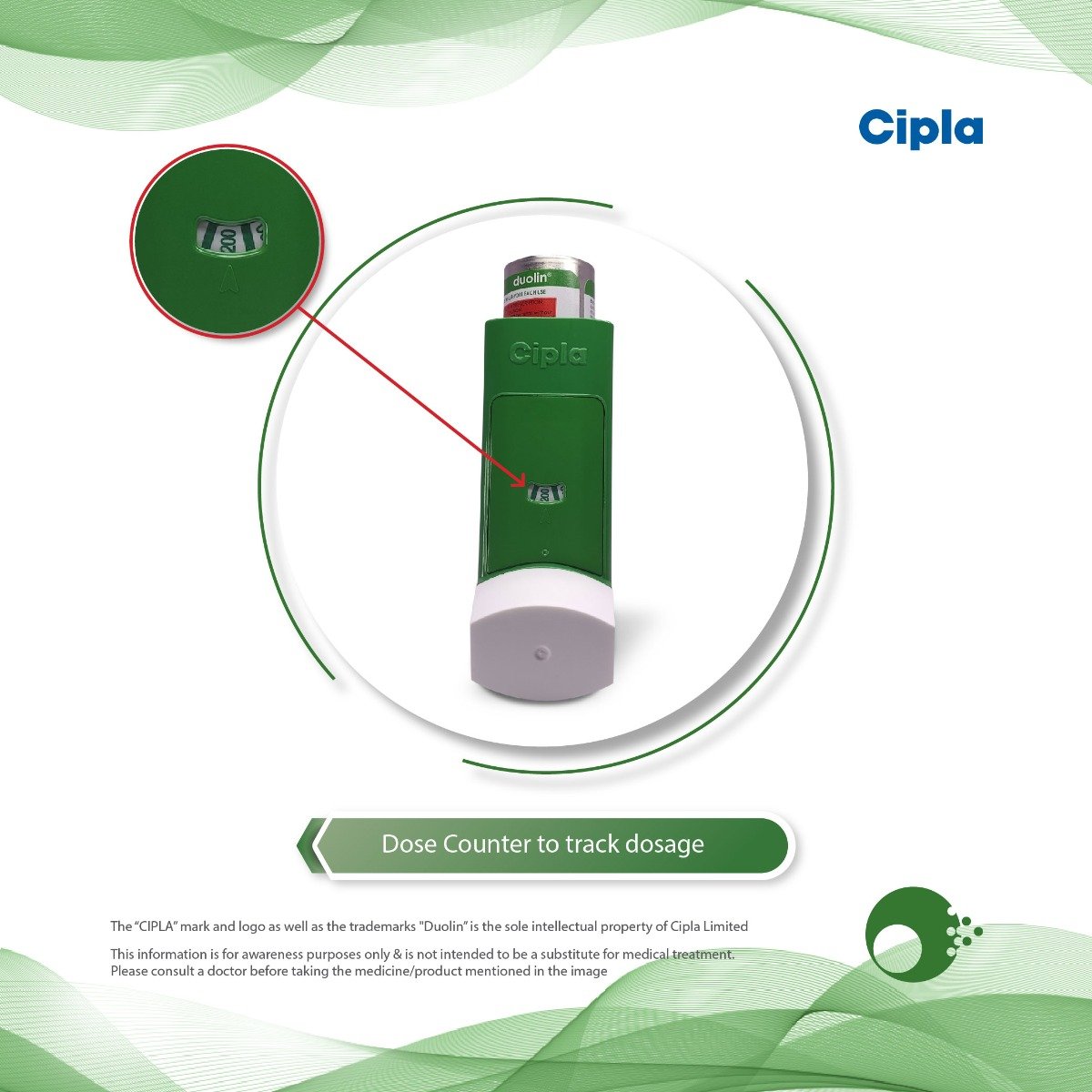
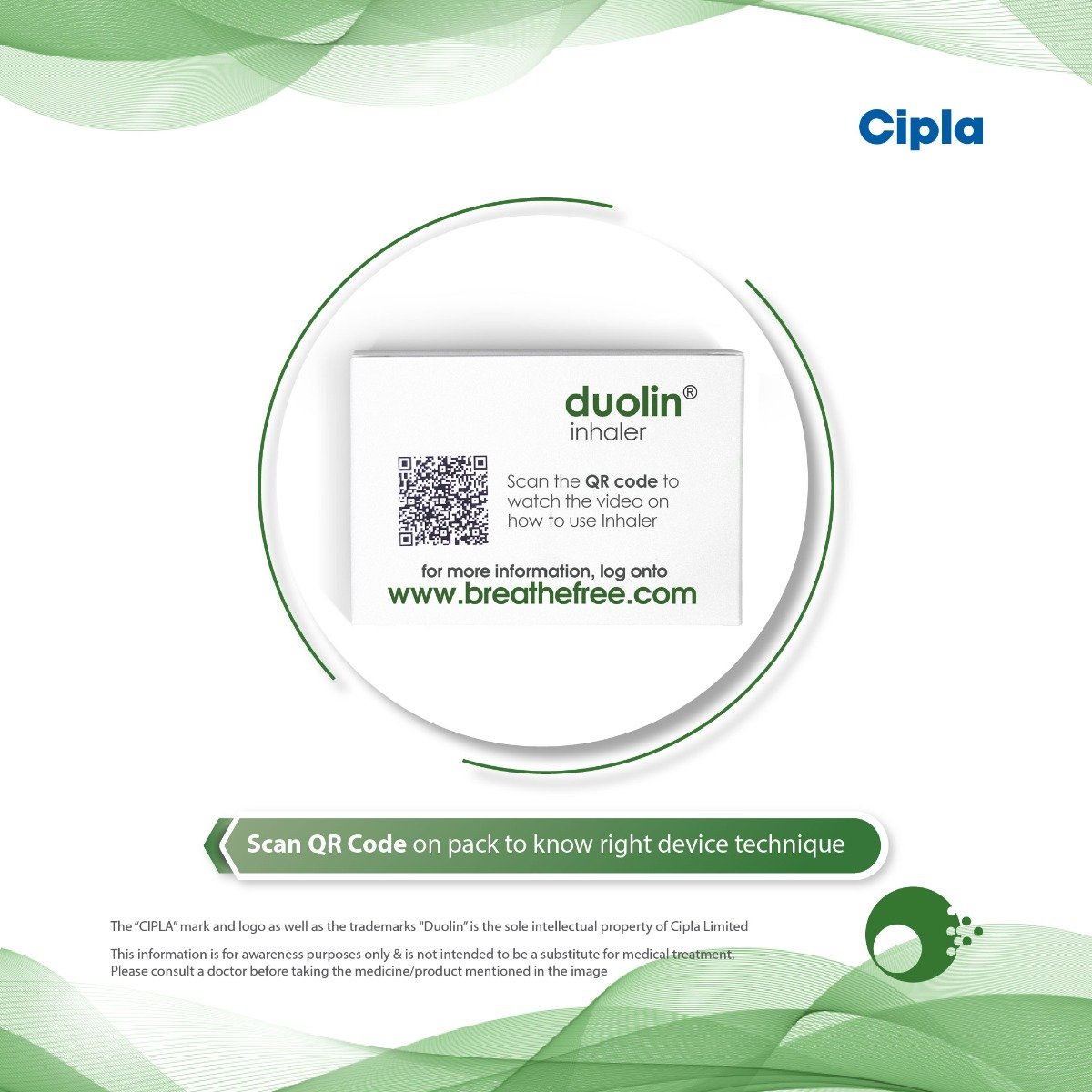
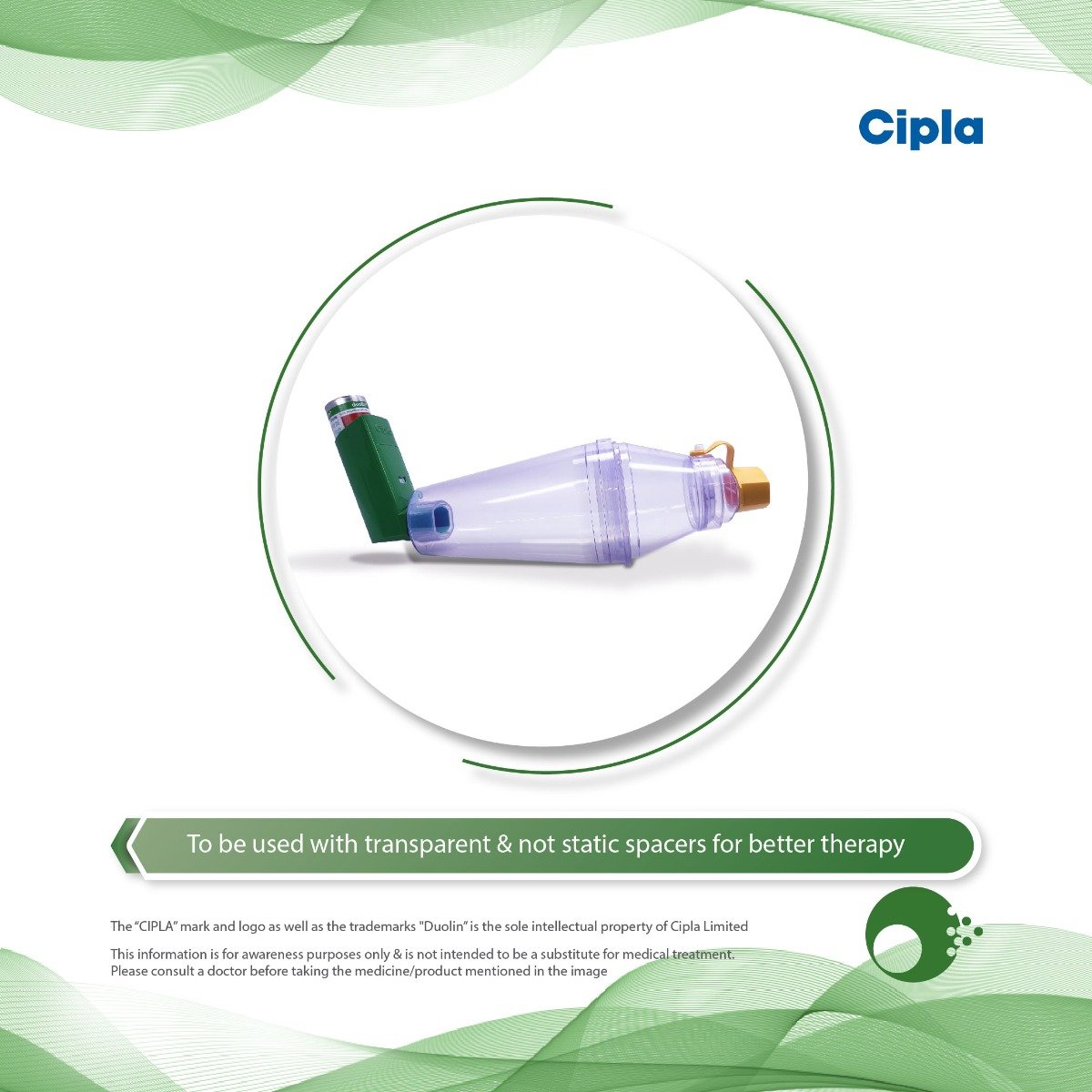
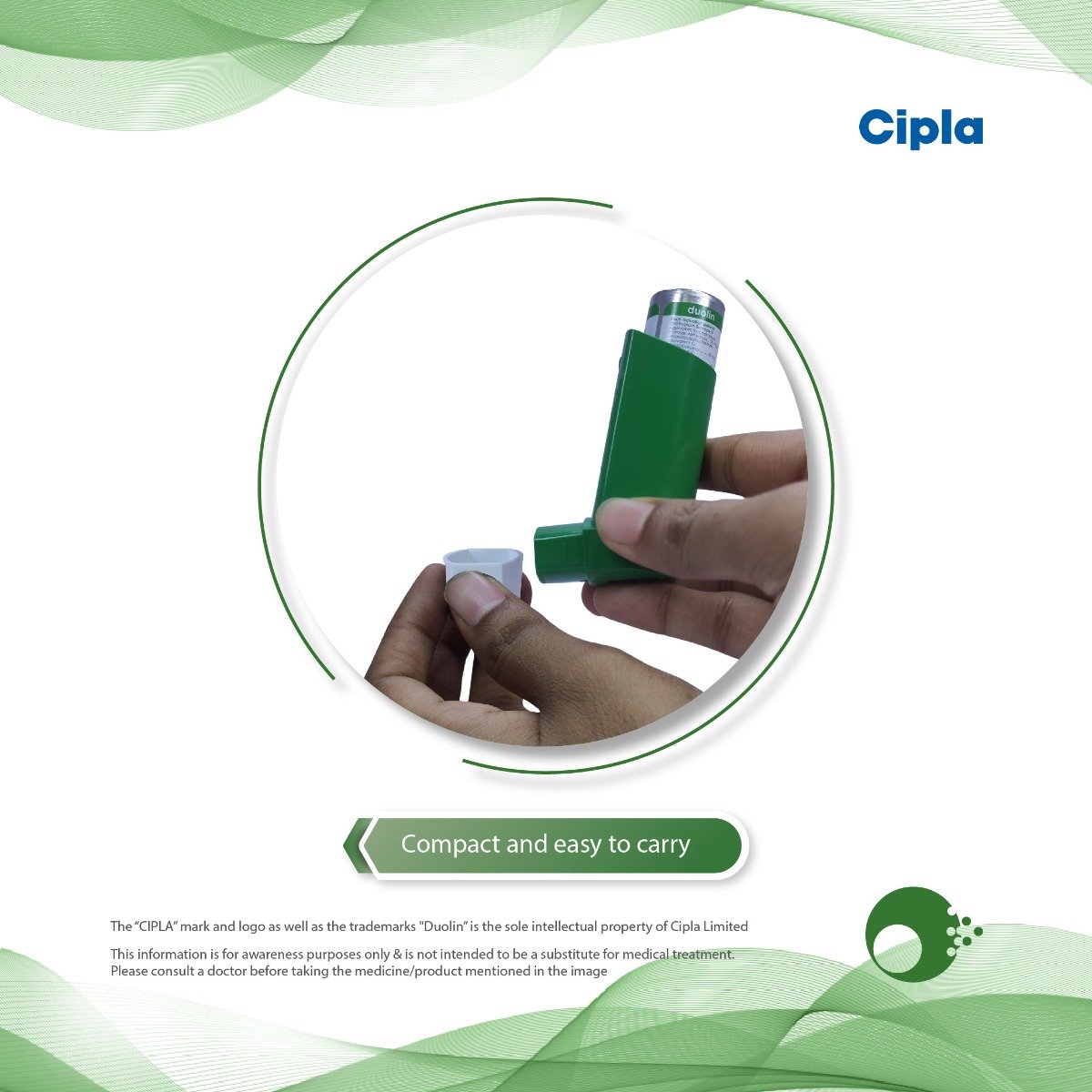
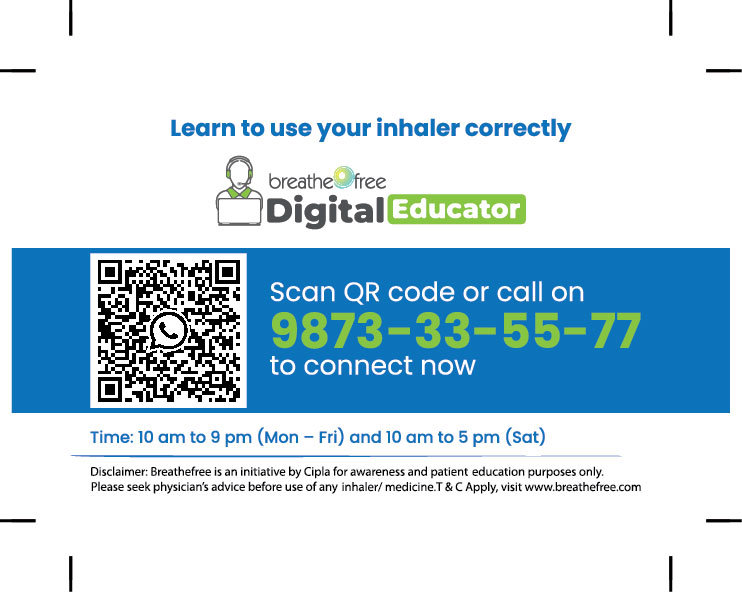
₹454
(Inclusive of all Taxes)
₹68.1 Cashback (15%)
Duolin Inhaler is used to treat or prevent chronic obstructive pulmonary disease (COPD). It contains Levosalbutamol and Ipratropium bromide, which work by relaxing muscles and widening the airways of the lungs. Some people may experience headaches, sore throat, dry mouth, tiredness, and vomiting. Before using this medicine, you should tell your doctor if you are allergic to any of its components or if you are pregnant/breastfeeding, and about all the medications you are taking and pre-existing medical conditions.
Know Your Delivery Time
Provide Delivery Location
 Prescription drug
Prescription drugWhats That
 139 people bought
139 people bought 
Secure Payment

India's Most Trusted Pharmacy

Genuine Products
Composition :
Manufacturer/Marketer :
Consume Type :
Return Policy :
Expires on or after :
About Duolin Inhaler
Duolin Inhaler is used to treat or prevent symptoms of chronic obstructive pulmonary disease (COPD), like shortness of breath, coughing or wheezing (whistling sound while breathing).
Duolin Inhaler contains Levosalbutamol and Ipratropium bromide, which work by relaxing muscles and widening the airways of the lungs. Thereby, it helps to breathe easily.
Duolin Inhaler may cause headache, sore throat, dry mouth, runny or stuffy nose, pain, cough with mucus, dizziness, nervousness, tiredness, and vomiting. If the side effects persist or worsen, please consult your doctor.
Do not use Duolin Inhaler if you are allergic to any of its components. If you are pregnant or breastfeeding, please consult a doctor. Keep your doctor informed about your health condition and medications to prevent any interactions.
Uses of Duolin Inhaler
Duolin Inhaler is used to treat chronic obstructive pulmonary disease (COPD). The detailed uses of Duolin Inhaler are as follows:
- Chronic Obstructive Pulmonary Disease (COPD): Duolin Inhaler is used in the management of COPD, including chronic bronchitis and emphysema, to relieve breathing difficulty caused by airway narrowing.
- Bronchospasm Relief: Provides quick and effective relief from bronchospasm (tightening of the muscles around the airways), helping reduce wheezing, coughing, and shortness of breath.
- Add-on Therapy for Inadequate Response to Single Bronchodilator: Indicated for patients already using a regular bronchodilator but still experiencing symptoms, requiring a second bronchodilator for better control.
- Improves Airflow in the Lungs: Helps to open up the airways, improving lung function and enhancing oxygen intake.
Directions for Use
- Follow your doctor's instructions on the dosage and timing of this medication.
- Hold the inhaler with the mouthpiece facing downwards. Form a tight seal by placing your lips around the mouthpiece. Start breathing slowly with your mouth and push down the inhaler once. Remove the inhaler and breathe normally.
- Duolin Inhaler is for inhalation purposes only.
Medicinal Benefits
- Duolin Inhaler helps open up the airways, making it easier to breathe for people with obstructive airway conditions.
- It provides quick relief from wheezing, shortness of breath, chest tightness, and coughing caused by constricted airways.
- It is effective in managing long-term lung diseases such as chronic bronchitis and emphysema.
- Duolin Inhaler contains Levosalbutamol (a beta-2 agonist) and Ipratropium Bromide (an anticholinergic), offering faster and more sustained bronchodilation than either drug alone.
- It enhances oxygen intake and reduces airway resistance, improving overall respiratory performance.
- Duolin Inhaler helps reduce airway sensitivity to allergens, cold air, or exercise, preventing sudden respiratory distress.
How Duolin Inhaler Works
Storage
- Tell your doctor about the cough symptoms you're experiencing, which may be triggered by your medication.
- Your doctor may adjust your treatment plan by changing your medication, adding new medications, or providing guidance on managing your cough symptoms.
- Practice good hygiene, including frequent handwashing, avoiding close contact with others, and avoiding sharing utensils or personal items.
- Stay hydrated by drinking plenty of fluids, such as water, tea, or soup, to help thin out mucus and soothe your throat.
- Get plenty of rest and engage in stress-reducing activities to help your body recover. If your cough persists or worsens, consult your doctor for further guidance.
- Tell your doctor immediately if you experience shortness of breath after taking medication.
- Your doctor may adjust the medication regimen or dosage or give alternative medical procedures to minimize the symptoms of shortness of breath.
- Monitor your oxygen levels and breathing rate regularly to track changes and potential side effects.
- For controlling stress and anxiety, try relaxation techniques like deep breathing exercises, meditation, or yoga.
- Make lifestyle changes, such as quitting smoking, exercising regularly, and maintaining a healthy weight.
- Seek emergency medical attention if you experience severe shortness of breath, chest pain, or difficulty speaking.
- Follow up regularly with your doctor to monitor progress, adjust treatment plans, and address any concerns or questions.
- If you experience symptoms like coughing, wheezing, chest tightness, or difficulty breathing after taking medication, seek medical attention immediately.
- Your healthcare provider will work with you to stop the medication causing the reaction, start alternative treatments, and provide supportive therapy.
- To manage symptoms and prevent complications, follow your doctor's advice to use inhalers or nebulizers as prescribed, practice good hygiene, avoid irritants, stay hydrated, and get plenty of rest.
- Regularly track your symptoms and report any changes or concerns to your healthcare provider.
- Inform your doctor about the common cold symptoms you're experiencing due to medication.
- Your doctor may adjust your treatment plan, which could include changing your medication, adding new medications, or offering advice on managing your symptoms.
- Practice good hygiene, including frequent handwashing, avoiding close contact with others, and avoiding sharing utensils or personal items.
- Drink plenty of fluids, such as warm water or soup, to help thin out mucus.
- Get plenty of rest and engage in stress-reducing activities to help your body recover. If your symptoms don't subside or worsen, consult your doctor for further guidance.
- Inform your doctor about the symptoms you're experiencing due to medication.
- Your doctor may adjust your treatment plan, which could include changing your medication, adding new medications, or offering advice on managing your symptoms.
- Practice good hygiene, including frequent handwashing, avoiding close contact with others, and avoiding sharing utensils or personal items.
- Stay hydrated by drinking plenty of fluids to help loosen and clear mucus from your nose, throat, and airways.
- Get plenty of rest and engage in stress-reducing activities to help your body recover. If your symptoms don't subside or worsen, consult your doctor for further guidance.
- Drink warm fluids such as warm water with honey, broth or herbal tea to soothe sore throat.
- Gargle with warm salt water to decrease inflammation.
- Suck on hard candies or lozenges to increase the production of saliva and soothe your throat.
- Avoid smoking, spicy foods, and extremely hot fluids.
- Rest your voice and get enough sleep.
- Drink plenty of fluids like water to thin mucus.
- Use a humidifier to moisten the air.
- Lie down in specific positions to help drain mucus from different areas of the lungs.
- Inhale steam from a bowl of hot water, it can help loosen mucus.
- Gargling with a saltwater solution can soothe a sore throat and help clear mucus.
- Gentle exercise can help mobilize mucus and clear airways.
- Limit exposure to smoke, dust, and other airborne irritants that can worsen mucus production.
- Consult your doctor if the issue persists or is accompanied by other concerning symptoms.
What if I have taken an overdose of Duolin Inhaler
Drug Warnings
- Do not use Duolin Inhaler if you are allergic to any of its components.
- If you experience severe difficulty in breathing, please consult a doctor immediately.
- Do not use Duolin Inhaler in more than the prescribed doses, as it may lead to severe heart or lung problems.
- Regular monitoring of potassium levels is recommended while taking Duolin Inhaler, as it may cause low potassium levels in the blood.
- If you experience irregular heartbeats, leg cramps, extreme thirst, constipation, increased urination, muscle weakness, numbness or tingling, please consult a doctor immediately, as these might be signs of low potassium.
- If you have high blood pressure, diabetes, epilepsy (fits), enlarged prostate, glaucoma, thyroid or heart problems, bladder obstruction or other urinary problems, inform your doctor before starting Duolin Inhaler.
- Consult your doctor if you are pregnant or breastfeeding.
- Let your doctor know if you are taking any other medicines, including supplements and herbal products.
Drug-Drug Interactions
Drug-Drug Interactions
Login/Sign Up
Co-administration of Salbutaml with Labetalol, the effectiveness of Duolin Inhaler might be reduced.
How to manage the interaction:
Although taking Labetalol and Duolin Inhaler together can possibly result in an interaction, it can be taken if a doctor has prescribed it. Do not discontinue any medications without a doctor's advice.
Using pindolol and Duolin Inhaler together can increase the risk of narrowing of the airways.
How to manage the interaction:
The combined use of pindolol and Duolin Inhaler can lead to an interaction, it can be taken if advised by your doctor. However, if you experience Coughing, wheezing, shortness of breath, and high-pitched breathing, contact your doctor immediately. Do not discontinue any medications without consulting a doctor.
Coadministration of mifepristone and Duolin Inhaler can increase the risk of an irregular heart rhythm which can be severe. The risk increases in patients with a history of heart illness or electrolyte imbalance.
How to manage the interaction:
Taking Duolin Inhaler with mifepristone together is avoided as it can result in an interaction, it can be taken if a doctor has advised it. However, contact a doctor immediately if you experience any symptoms such as dizziness, lightheadedness, fainting, shortness of breath, or irregular heartbeat. Do not discontinue any medications without consulting a doctor.
Using levobunolol and Duolin Inhaler together can reduce the benefits of both drugs and can cause narrowing of the airways.
How to manage the interaction:
The combined use of levobunolol and Duolin Inhaler can lead to an interaction, it can be taken if advised by your doctor. Don't forget to inform if you have any history of asthma, or severe chronic obstructive pulmonary disease (COPD), consult the doctor immediately. Do not stop using any medications without a doctor's advice.
The combined use of Papaverine and Duolin Inhaler can increase the risk of an irregular heart rhythm which can be severe. The risk increases in patients with a history of heart illness or electrolyte imbalance.
How to manage the interaction:
Co-administration of Papaverine and Duolin Inhaler can lead to an interaction, it can be taken if advised by your doctor. However, if you experience any symptoms like dizziness, lightheadedness, fainting, shortness of breath, or heart palpitations, consult the doctor immediately. Do not stop using any medications without a doctor's advice.
Co-administration of Duolin Inhaler with timolol can increase the risk of narrowing of the airways.
How to manage the interaction:
Although taking Duolin Inhaler and timolol together can possibly result in an interaction, it can be taken if your doctor has advised it. However, if you experience Coughing, wheezing, shortness of breath, and high-pitched breathing, contact your doctor immediately. Do not discontinue any medications without consulting a doctor.
Coadministration of Carvedilol and Duolin Inhaler may reduce the effects of both medications.
How to manage the interaction:
Although there is a possible interaction between Carvedilol and Duolin Inhaler, they can be taken if your doctor advises. Consult your doctor if you experience shortness of breath, chest pain or any difficulties in breathing. Do not stop using any medications without a doctor's advice.
Coadministration of Penbutolol and Duolin Inhaler can reduce the effects of both medications and can cause narrowing of the airways.
How to manage the interaction:
Taking Penbutolol and Duolin Inhaler can lead to an interaction, it can be taken if advised by your doctor. However, if you experience Coughing, wheezing, shortness of breath, and high-pitched breathing, contact your doctor immediately. Do not discontinue any medications without consulting a doctor.
Using propranolol and Duolin Inhaler together can reduce the effects or increase the risk of narrowing of the airways.
How to manage the interaction:
The combined use of propranolol and Duolin Inhaler can lead to an interaction, but they can be taken if advised by your doctor. However, if you experience any unusual symptoms contact your doctor immediately. Do not stop using any medications without first talking to your doctor.
Drug-Food Interactions
Drug-Food Interactions
Login/Sign Up
Diet & Lifestyle Advise
- Eat foods rich in potassium, such as tomatoes, bananas, asparagus, oranges, potatoes, avocados, dark leafy greens, and beetroots, as potassium is important for lung function and a potassium deficiency may cause breathing problems.
- Drink plenty of fluids every day to thin mucus, which makes it easier to cough out.
- Maintain a diet that includes complex carbohydrates such as lentils, beans, barley, oats, quinoa, bran, peas, and potatoes with skin.
- Limit or avoid the intake of caffeinated drinks such as tea, coffee, soda, and energy drinks.
- Eat protein-rich foods such as meat, fish (particularly salmon, sardines, and mackerel), eggs, and poultry.
- Exercise regularly to strengthen your breathing muscles and boost your immune system. Learning breathing exercises will help you move more air in and out of your lungs.
- Quit smoking as it may reduce the effectiveness of the Duolin Inhaler and irritate the lungs, worsening breathing problems.
Habit Forming
Therapeutic Class
Product Substitutes
Alcohol
Caution
The interaction of Duolin Inhaler with alcohol is unknown. Please consult a doctor before consuming alcohol with Duolin Inhaler.
Pregnancy
Caution
The safety of Duolin Inhaler in pregnant women is unknown and is given to pregnant women only if the doctor thinks benefits outweigh risks.
Breast Feeding
Caution
It is unknown whether Duolin Inhaler is excreted in human milk. It is given to breastfeeding mothers only if the doctor thinks benefits are greater than risks.
Driving
Caution
Duolin Inhaler may cause blurred vision or dizziness in some people. Therefore, avoid driving if you notice any changes in vision or feel dizzy after taking Duolin Inhaler.
Liver
Consult your doctor
If you have any concerns regarding the use of Duolin Inhaler in patients with Liver problems, please consult a doctor.
Kidney
Consult your doctor
If you have any concerns regarding the use of Duolin Inhaler in patients with Kidney problems, please consult a doctor.
Children
Caution
Please consult a doctor before giving Duolin Inhaler to children.
Health Queries
Duolin using before food or ofter food
Dr Bayyarapu Kumar
M Pharmacy

Have a query?
FAQs
Duolin Inhaler is used to treat or prevent symptoms of chronic obstructive pulmonary disease (COPD), like shortness of breath, coughing or wheezing (whistling sound while breathing). It works by relaxing muscles and widening the airways of the lungs.
Duolin Inhaler should be used with caution in diabetic patients if prescribed by a doctor. However, regular monitoring of blood sugar levels is recommended while taking Duolin Inhaler as it may increase blood sugar levels.
Yes, Duolin Inhaler may cause blurred vision in some patients. It is not necessary for everyone taking Duolin Inhaler to experience this side effect. Therefore, avoid driving if you notice any changes in vision after taking Duolin Inhaler.
Duolin Inhaler should be used with caution in hyperthyroid (overactive thyroid) patients as it may worsen the condition. Inform your doctor if you have hyperthyroidism before taking Duolin Inhaler so that the dose may be adjusted appropriately. However, regular monitoring of thyroid hormone levels is recommended while taking Duolin Inhaler.
Yes, Duolin Inhaler may cause dry mouth as a temporary side effect in some people. It is not necessary for everyone taking Duolin Inhaler to experience this side effect. However, to avoid such side effects, drink plenty of water, regularly rinse your mouth, practice good oral hygiene and suck on sugarless candy. However, if the condition persists or worsens, please consult a doctor.
No, you are not recommended to stop taking Duolin Inhaler without consulting your doctor, as it may worsen the condition or cause recurring symptoms. Therefore, take Duolin Inhaler for as long as your doctor has prescribed it, and if you experience any difficulty while taking Duolin Inhaler, please consult your doctor.
No, Duolin Inhaler does not relieve sudden symptoms such as shortness of breath. Therefore, it is advised to carry a rescue inhaler always to treat sudden symptoms.
No, Duolin Inhaler is not a steroid. It is a combination medication that contains levosalbutamol and ipratropium bromide. These ingredients work together to help relax the air passages' muscles, making breathing easier. Duolin Inhaler is commonly used to treat chronic obstructive pulmonary disease (COPD) and asthma.
Duolin Inhaler may cause side effects such as headache, sore throat, dry mouth, and respiratory issues like cough, sneezing, and difficulty breathing. Other possible side effects include dizziness, nervousness, tiredness, irregular heartbeats, and vomiting. In most cases, these side effects are temporary and resolve on their own. However, if they persist or worsen, it's essential to consult your doctor for proper guidance.
Yes, Duolin Inhaler nebulization is considered safe when used as prescribed by your doctor. It is commonly used to manage respiratory conditions such as asthma and chronic obstructive pulmonary disease (COPD). Duolin Inhaler contains two active ingredients: ipratropium bromide and salbutamol, which work together to relax the airways' muscles, making breathing easier.
When taking Duolin Inhaler, it's crucial to exercise caution with concomitant medications that may interact or exacerbate adverse effects. Certain medicines that stimulate the heart or increase blood pressure may potentiate the effects of Duolin Inhaler, while others may counteract its therapeutic benefits. To ensure safe and effective treatment, consult your doctor for personalised guidance on potential medication interactions.
No, taking higher doses of Duolin Inhaler will not necessarily make it more effective, and it can increase the risk of side effects like increased heart rate, tremors, and other complications. It is vital to use the medication exactly as prescribed by your doctor. If you feel that your current dosage is not providing adequate relief, consult your doctor for advice rather than adjusting the dose on your own.
No, Duolin Inhaler is not typically known to cause sleepiness or drowsiness. However, individual reactions to medications can vary, and if you experience any unusual symptoms, it is essential to consult your doctor.
Store Duolin Inhaler below 30°C. Please keep them in their original packaging to protect them from light and moisture. Do not freeze. Keep out of reach of children. Do not dispose of medications in household trash or wastewater. Follow local regulations for the disposal of medications.
Country of origin
Manufacturer/Marketer address
Customers Also Bought
Disclaimer
Author Details
We provide you with authentic, trustworthy and relevant information
Buy best Respiratory System products by
Cipla Ltd
Glenmark Pharmaceuticals Ltd
Lupin Ltd
Alkem Laboratories Ltd
Sun Pharmaceutical Industries Ltd
Mankind Pharma Pvt Ltd
Macleods Pharmaceuticals Ltd
Zydus Healthcare Ltd
Leeford Healthcare Ltd
Dr Reddy's Laboratories Ltd
Zydus Cadila
Pristine Pearl Pharma Pvt Ltd
Abbott India Ltd
Intas Pharmaceuticals Ltd
Alembic Pharmaceuticals Ltd
German Remedies Ltd
Aristo Pharmaceuticals Pvt Ltd
Zuventus Healthcare Ltd
Centaur Pharmaceuticals Pvt Ltd
Wockhardt Ltd
Koye Pharmaceuticals Pvt Ltd
Ipca Laboratories Ltd
Micro Labs Ltd
GlaxoSmithKline Pharmaceuticals Ltd
Blue Cross Laboratories Pvt Ltd
Med Manor Organics Pvt Ltd
Seagull Pharmaceutical Pvt Ltd
Torque Pharmaceuticals Pvt Ltd
Medishri Healthcare Pvt Ltd
East West Pharma India Pvt Ltd
Indiabulls Pharmaceuticals Pvt Ltd
Tablets India Ltd
Uniza Healthcare Llp
Yash Pharma Laboratories Pvt Ltd
Adonis Laboratories Pvt Ltd
Divine Savior Pvt Ltd
FDC Ltd
Fourrts India Laboratories Pvt Ltd
Capital Pharma
Corona Remedies Pvt Ltd
J B Chemicals & Pharmaceuticals Ltd
Shreya Life Sciences Pvt Ltd
Unipark Biotech Pvt Ltd
Vasu Organics Pvt Ltd
Indoco Remedies Ltd
Wings Pharmacuticals Pvt Ltd
Apex Laboratories Pvt Ltd
Biological E Ltd
Skn Organics Pvt Ltd
Wanbury Ltd
Best Biotech
Eysys Pharmaceutical Pvt Ltd
Healthgate Pvt Ltd
Icarus Health Care Pvt Ltd
Stedman Pharmaceuticals Pvt Ltd
Steris Healthcare
Torrent Pharmaceuticals Ltd
Innoglide Pharmaceuticals Pvt Ltd
Intra Life Pvt Ltd
Lincoln Pharmaceuticals Ltd
Navil Laboratories Pvt Ltd
Precept Pharma
Comed Chemicals Ltd
Dolvis Bio Pharma Pvt Ltd
Elder Pharmaceuticals Ltd
Entod Pharmaceuticals Ltd
Geno Pharmaceuticals Pvt Ltd
La Renon Healthcare Pvt Ltd
Megma Healthcare Pvt Ltd
Stryker Pharma Pvt Ltd
Brinton Pharmaceuticals Ltd
Embiotic Laboratories (P) Ltd
Incite Pharmaceuticals
Kepler Healthcare Pvt Ltd
Modi Mundipharma Pvt Ltd
Pfizer Ltd
Sanatra Healthcare Ltd
Timon Pharmaceuticals Pvt Ltd
Wellok Pharma
Aar Ess Remedies Pvt Ltd
Bacans Biotech Pvt Ltd
Balin Healthcare Pvt Ltd
Chemo Healthcare Pvt Ltd
Emcee Pharmaceuticals (P) Ltd
Foregen Healthcare Ltd
Knoll Pharmaceuticals Ltd
Prevego Healthcare & Research Pvt Ltd
RPG Life Sciences Ltd
Silver Cross Medisciences Pvt Ltd
Zee Laboratories Ltd
Aglowmed Pharmaceuticals Ltd
Alienist Pharmaceutical Pvt Ltd
Alniche Life Sciences Pvt Ltd
Astra Zeneca Pharma India Ltd
Astrum Healthcare Pvt Ltd
Bio Warriors Pharmaceucticals Pvt Ltd
Biochemix Health Care Pvt Ltd
Cadila Pharmaceuticals Ltd
Eisen Pharmaceutical Co Pvt Ltd
Flaring Formulations Pvt Ltd
Franco Indian Pharmaceuticals Pvt Ltd
Group Pharmaceuticals Ltd
Iva Healthcare Pvt Ltd
Maneesh Pharmaceuticals Ltd
Medfence Labs
Morepen Laboratories Ltd
Olcare Laboratories Pvt Ltd
Rnd Laboratories Pvt Ltd
Thuyam Life Pvt Ltd
Votary Laboratories (India) Ltd
Wallace Pharmaceuticals Pvt Ltd
Yuventis Pharmaceuticals
Baxium Healthcare
Bioceutics Inc
Biochem Pharmaceutical Industries Ltd
Caplet India Pvt Ltd
Clyde Pharmaceutical Pvt Ltd
Delcure Life Sciences Ltd
Druto Laboratories
Elamus Pharmaceuticals Pvt Ltd
Eris Life Sciences Ltd
Heal (India) Laboratories Pvt Ltd
Hetero Healthcare Pvt Ltd
Hibiscus Pharmaceuticals Pvt Ltd
Honest Care Pharmaceuticals
Indchemie Health Specialities Pvt Ltd
Klm Laboratories Pvt Ltd
Kristal Pharmaceuticals
Laborate Pharmaceuticals India Ltd
Medsmile Pharmaceuticals Pvt Ltd
Mint Pharmaceuticals Pvt Ltd
Msn Laboratories Pvt Ltd
Nest Pharma
Panacea Biotec Ltd
Samsunn Healthcare Pvt Ltd
Tas Med India Pvt Ltd
Ultrapolis Lifesciences Pvt Ltd
Unimarck Pharma India Ltd
Veritaz Healthcare Ltd
Acclimate Life Sciences
Acron Pharmaceuticals
Ajanta Pharma Ltd
Akumentis Healthcare Ltd
Anhox Healthcare Pvt Ltd
Aurz Pharmaceutical Pvt Ltd
Biophar Lifesciences Pvt Ltd
Bioshine Healthcare Pvt Ltd
Cadila Healthcare Ltd
Dwd Pharmaceuticals Ltd
Emcure Pharmaceuticals Ltd
Ferventis Healthcare
Floreat Medica Pvt Ltd
Gene Lifecare
Gravitas Formulations
Gujarat Terce Laboratories Ltd
Hbc Life Sciences Pvt Ltd
Hippo Labs Pvt Ltd
Jasvas Biologicals Pharma Pvt Ltd
Jenburkt Pharmaceuticals Ltd
Juggat Pharma Ltd
Karnataka Antibiotics & Pharmaceuticals Ltd
Lemark Remedies
Life Gain Pharma Company
Mars Therapeutics and Chemicals Ltd
May & Baker Pharmaceuticals Ltd
Medford Pharmaceuticals
Mirth Pharmaceuticals
Neon Laboratories Ltd
Omenta Pharma Pvt Ltd
Orn Remedies Pvt Ltd
Samarth Life Sciences Pvt Ltd
Shankus Acme Pharma Pvt Ltd
Signova Pharma
Stadmed Pvt Ltd
Stelios Pharmaceuticals Llp
Wellwok Pharma
Wellyou Biotech
Winheal Healthcare Llp
Adisys Healthcare
Alna Biotech Pvt Ltd
Alvio Pharmaceuticals Pvt Ltd
Aptus Pharma Pvt Ltd
Avis Lifecare Pvt Ltd
Biovitamins Pvt Ltd
Cachet Pharmaceuticals Pvt Ltd
Chlorophyll Pharmaceuticals
Citizen Life Science Pvt Ltd
Concept Pharmaceuticals Ltd
Deekay Lifesciences
Encore Healthcare Pvt Ltd
Finecure Pharmaceuticals Ltd
Galpha Laboratories Ltd
Gennext Life Sciences
Gladstone Pharma India Pvt Ltd
Hetero Drugs Ltd
Ideal Life Sciences Pvt Ltd
Intra Labs India Pvt Ltd
Jacsims Pharmaceuticals Ltd
Keimed Pvt Ltd
Kinesis Pharmaceuticals Pvt Ltd
MMC Healthcare Ltd
Maestro Healthcare Ltd
Medgen Drugs And Laboratories Pvt Ltd
Nexkem Pharmaceuticals Pvt Ltd
Noel Pharma India Pvt Ltd
Ordain Health Care Global Pvt Ltd
Overseas Health Care Pvt Ltd
Ozone Pharmaceuticals Ltd
Pedison Pharma
Rhine Biogenics Pvt Ltd
Rite Labs
Ronish Bioceuticals
Ronyd Healthcare Pvt Ltd
Scott Edil Pharmacia Ltd
Smart Laboratories Pvt Ltd
Sunij Pharma Pvt Ltd
Swisskem Healthcare
TTK Healthcare Ltd
Ultimate Health Care
Unimarck Healthcare Pvt Ltd
Venus Remedies Ltd
Vivid Biotech (India) Pvt Ltd
West Coast Pharmaceuticals Pvt Ltd
Zoic Life Sciences
AMICA LIFE SCIENCE
Aamorb Pharmaceuticals Pvt Ltd
Acme Pharmaceuticals
Altcare Pharmaceuticals Pvt Ltd
Anchem Laboratories Pvt Ltd
Bayer Pharmaceuticals Pvt Ltd
Borntowin Health Care
Cadomed Pharmaceuticals India Pvt Ltd
Clover Health Care Pharma
Dales Laboratories Pvt Ltd
Dhamus Pharma
Dr Moni Pharmaceuticals Pvt Ltd
Ernst Pharmacia
Esteve Pharma Pvt Ltd
Femgrace Formulations
Genesis Biotech
Grandcure Healthcare Pvt Ltd
Gufic Bioscience Ltd
Hauz Pharma Pvt Ltd
Hegde & Hegde Pharmaceutica Llp
Ind-Swift Ltd
Indi Pharma Pvt Ltd
Inga Laboratories Pvt Ltd
Innovative Life Sciences Pvt Ltd
Jupiter Life Sciences Pvt Ltd
Kabson Medicare
Kaps Three Life Sciences Pvt Ltd
Kham Pharma
Klokter Life Sciences Ltd
Lewin Healthcare
Lifeline Healthcare Pvt Ltd
Mankind Prime Labs Pvt Ltd
Mediwin Laboratories
Medopharm Pvt Ltd
Menrik Biomerge Pvt Ltd
Merril Pharma Pvt Ltd
Meyer Organics Pvt Ltd
Mtcare Lifesciences Pvt Ltd
Narankaa Pharma
Nextgen Healthcare
Nilrise Pharmaceuticals Pvt Ltd
Nouvelle Pharmaceuticals
Nutrilis Healthcare Pvt Ltd
Orris Pharmaceuticals
Periwinkle Healthcare Pvt Ltd
RB Pharmaceuticals
Rapross Pharmaceuticals Pvt Ltd
Resolute Healthcare
Sanify Healthcare Pvt Ltd
Seagull Laboratories (I) Pvt Ltd
Shivanee Healthcare
Siloam Pharmaceuticals Pvt Ltd
Silok Pharmaceuticals
Stanford Organics
Synchem Laboratories Pvt Ltd
Systemic Healthcare
Torway Pharmacia Pvt Ltd
Toyo Laboratories Pvt Ltd
Trizova Pharmaceuticals
United Biotech Pvt Ltd
United Laboratories
Venera Pharma
Venmed Life Science Pvt Ltd
Ventus Pharma
WONDER DRUG PVT LTD
Wellcure Lifesciences
Yoku Healthcare Pvt Ltd
Zerico Lifesciences Pvt Ltd
Zota Health Care Ltd
AAA Pharma Trade Pvt Ltd
Aareen Healthcare Pvt Ltd
Akmma Laboratories Pvt Ltd
Alcott Healthcare Pvt Ltd
Anglo French Drugs & Industries Ltd
Astrica Biomedics Pvt Ltd
Auster Lifescience Pvt Ltd











